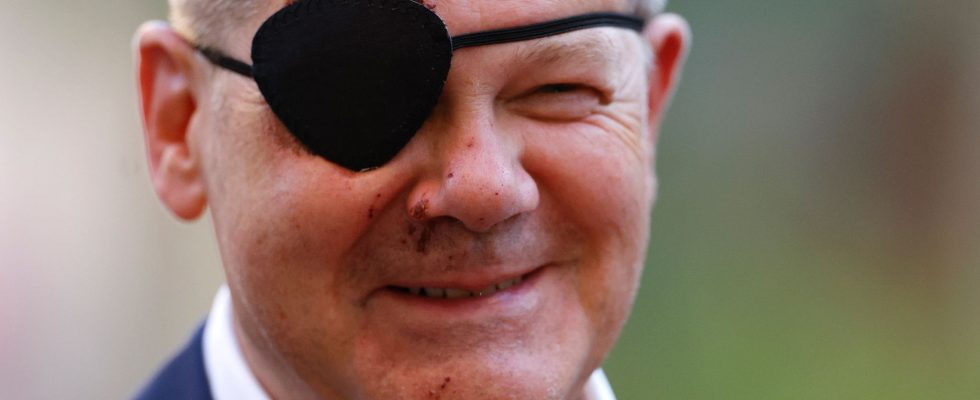He may look like a pirate, with his black mask covering his right eye, Olaf Scholz did not impress many people, Wednesday, September 6, during his speech at the Federal Assembly (Bundestag). The Chancellor, who injured his face while jogging, demanded that the conservative opposition, but also the local authorities, “shake themselves up” to “get out of the doldrums”. “Citizens are tired of being at an impasse and so am I,” he added.
Not sure, however, that this incantation is enough to restore confidence in Germans who, since reunification, have never doubted their future so much. High inflation, high energy costs, loss of competitiveness… Nothing is going well in Europe’s leading power. In question ? A “coalition of progress” which – to put it mildly – does not convince. At least two out of three Germans, according to polls, no longer support the “Guignol theater” delivered to Berlin by the three ruling parties. The latest, published on August 31 by the first public television channel (ARD), is clear: 79% dissatisfied, the lowest level since the Scholz government took office in 2021. The absence of discipline and cohesion, but also the intrigues and dirty tricks fanned by the popular press, are not at all to the liking of the population, after 16 years of serene governance under Merkel. “The problem is that there is no possible alternation. No party in power has an interest in calling early elections”, analyzes Ursula Münch, director of the Academy of Political Science in Tutzing, Bavaria . “This government is doomed to stay in power until 2025.”
government inaudible
Painfully out of the polls, this tripartite coalition between social democrats (SPD), ecologists and liberals (FDP) was considered from the start as perilous. “Everyone knew it was going to be very complicated. Ecologists and liberals have a diametrically opposed conception of the state”, continues Ursula Münch. When some are in favor of lowering taxes, others advocate subsidies. How to govern with the Greens in favor of the removal of the “debt brake” to finance the energy transition, and the Liberals, a clientelist party, who demand the return of nuclear power, budgetary discipline and the maintenance of the combustion engine?
Never has a government been so inaudible. Worse, the first “threesome” in the history of the Federal Republic unpacks all its conflicts in the public square. “The disputes in politics used to take place behind the scenes. The result of the negotiations was then announced at a press conference, avoiding leaks”, recalls Uwe Jun, political scientist at the University of Trier. Today, Scholz ministers draw their cell phones to communicate in all directions, even though the meetings are not over. As soon as a decision is made, environmentalists and liberals engage in an escalation of announcements on the networks congratulating each other on having obtained a compromise, a victory, or accusing the other of having sabotaged their projects.
Thus, Robert Habeck, the Green Minister for the Economy and the Climate, has publicly accused the Liberals of having sabotaged his bill on the replacement of oil heaters by providing unfinished texts to the press. To obtain an increase in social minima, the Minister for the Family, Lisa Paus, for her part refused to ratify the tax relief program of the Liberal Minister of Finance, Christian Lindner. Liberals whose retention in the Bundestag in 2025 is not at all certain.
Failing authority
But what does the Chancellor do? Unable to ensure the cohesion of his government, Olaf Scholz succeeded only once in exercising authority, at the end of 2022, on the closure of the last three German nuclear power plants that the liberals wanted to keep in operation. . The rest of the time, he is content to pass soaps to his allies, as at the Open Days of the Chancellery, at the end of August. “Maybe one or the other will one day get used to talking after they have agreed,” he replied to visitors who asked him about the cacophony of his team. “His management remains miserable on the whole and reinforces the mistrust of voters,” judge Uwe Jun. “The Chancellor does not know how to bang his fist on the table, abounds Ursula Münch. His ‘quiet strength’ style exasperates the Germans. He is perceived as arrogance.” Even the youth of the SPD are in despair at his lethargy. “We should shake up Olaf Scholz,” quipped Philipp Türmer, vice-president of the young social democrats (Jusos).
As for the Christian-Democratic opposition, which hoped to pull the chestnuts out of the fire, it no longer represents a serious alternation. The new CDU leader, Friedrich Merz, failed to make himself popular, even with his anti-Merkel profile. “His party has remained in power for too long and does not constitute a protest vote”, explains Uwe Jun. Recession, inflation, energy transition, poor infrastructure, stifling bureaucracy, labor shortages, new influx of refugees… Since the war in Ukraine, Germany has found itself vulnerable despite having confidence in its economic model. . The “made in Germany”, which until now was running on cheap Russian gas and massive investments in China, is fundamentally called into question. According to a study by the Allensbach Institute, half of Germans think that the Federal Republic will no longer be a leading economic nation in ten to fifteen years!
In this context, the far right is doing well. For the past few months, the AfD (Alternative für Deutschland) has been leading the polls with more than 30% of the votes in the Eastern regions. of the country (former GDR), where important regional elections will take place in a year. Despite its increasingly radical positions, this group is gaining in influence. If the polls are confirmed at the polls, it could challenge the “sanitary cord” which has held so far in Germany and become the first political force in the East in 2024 and the second in Germany in 2025. If it is the case, “the quarrels of the government will have largely contributed to it”, estimates Uwe Jun.
